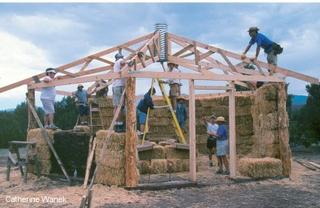 Builders Without Borders is an organization that can prove very effective in disaster housing through their technology, resources, training and volunteers.
Builders Without Borders is an organization that can prove very effective in disaster housing through their technology, resources, training and volunteers."We are an international network of ecological builders who form partnerships with communities and organizations around the world to create affordable housing from local materials and to work together for a sustainable future. We believe the solution to homelessness is not merely housing, but a local population trained to provide housing for themselves."
Housing is a human right - yet increasing numbers of people are homeless, due to war and environmental disasters. In Kosovo alone, an estimated 100,000 homes were damaged or destroyed, while recent flooding in Vietnam has left 2 million homeless. After initial disaster relief, longer-term solutions such as transitional housing are required, as well as the restoration or replacement of homes in devastated areas. Permanent housing is also needed for the chronically underhoused, whose situations are often as desperate as those recovering from a war or natural disaster.
Since its founding in December of 1999, Builders Without Borders (BWB) has formed a dynamic team of ecological builders and other volunteers dedicated to manifesting the idea that the solution to homelessness is not merely housing, but a local population trained to provide housing for themselves. They have determined their role to be largely educational -- their goal is to support those working in the field, through providing resources, advice, networking, and training so that hard-won successes can be widely shared and disseminated.
They advocate the use of straw, earth, and other easily obtainable materials for the construction of homes, to help decrease reliance on expensive, and often unavailable, alternatives. They are developing simple, easy-to-understand educational resources that can be used as a reference in training communities in appropriate technologies for siting and building their own shelter. One of our main objectives is to develop and distribute educational resources that promote natural building methods as well as facilitation techniques that are culturally-sensitive, fun and effective. BWB also focuses on training programs, workshops and cooperative community building projects to instruct people in ecological design and building.
Builders Without Borders believes that within the problem lies the solution. Disaster can be an opportunity to create something positive and healing. Their view is that we can best work in partnership with local populations to identify needs and propose solutions, and through our involvement leverage important information and material resources.
For more information visit: www.builderswithoutborders.org
Comments